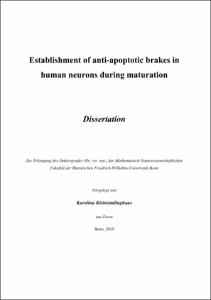Establishment of anti-apoptotic brakes in human neurons during maturation

Establishment of anti-apoptotic brakes in human neurons during maturation

| dc.contributor.advisor | Koch, Philipp | |
| dc.contributor.author | Kleinsimlinghaus, Karolina | |
| dc.date.accessioned | 2020-04-27T00:43:17Z | |
| dc.date.available | 2020-12-01T23:00:20Z | |
| dc.date.issued | 29.11.2019 | |
| dc.identifier.uri | https://hdl.handle.net/20.500.11811/8107 | |
| dc.description.abstract | Neurons represent a highly specialised cell population of the central and peripheral nervous system, which is responsible for spreading information throughout the body. They are born during embryonic development and persist throughout the entire life span of an individual. Since during the development of the nervous system an excess of neurons is produced, some neurons undergo apoptosis to guarantee the correct number of neurons required for the formation of neuronal networks. In immature neurons cell death pathways are freely active, while in mature neurons apoptosis is highly controlled. They have developed elaborated strategies to protect themselves against stress and apoptosis. This study set out to decipher, whether mature neurons are more resistant toward stress than their immature counterparts and to elucidate which pathways and proteins promote the stress resistance. Experiments reveal that during the time course of maturation, iPS cell-derived neurons become increasingly resistant to several types of cellular stressors. This goes along with a failure to activate caspase3 and a downregulation of caspase9. Comparative gene expression analysis was performed to develop deeper insights into the different stress resistance between immature and mature neurons. In mature neurons upregulated protective genes, converging into the AKT pathway, were identified. The elevated activity of the AKT pathway in mature neurons was supported by Western blot analysis. Additionally, the small heat shock protein Cryab upregulated in mature neurons was of interest. Western blot analysis confirmed its expression and upregulation upon stress. Cryab was of special interest because the common heat shock response is attenuated in mature neurons. In line with this, a downregulation of Hsp70 and Hsp27 was shown. To investigate the contribution of Cryab to the stress resistance of mature neurons, Cryab knockout neural stem cells were generated using CRISPR/Cas9-mediated gene editing. The disruption of Cryab increased the susceptibility of mature neurons especially to redox- and autophagy stress. Together this points out that mature neurons are equipped with several strategies: the downregulation of pro apoptotic proteins, the activation of a pro survival pathway and the upregulation of protective proteins, to protect against stress. | en |
| dc.language.iso | eng | |
| dc.rights | In Copyright | |
| dc.rights.uri | http://rightsstatements.org/vocab/InC/1.0/ | |
| dc.subject.ddc | 570 Biowissenschaften, Biologie | |
| dc.subject.ddc | 610 Medizin, Gesundheit | |
| dc.title | Establishment of anti-apoptotic brakes in human neurons during maturation | |
| dc.type | Dissertation oder Habilitation | |
| dc.publisher.name | Universitäts- und Landesbibliothek Bonn | |
| dc.publisher.location | Bonn | |
| dc.rights.accessRights | openAccess | |
| dc.identifier.urn | https://nbn-resolving.org/urn:nbn:de:hbz:5-56467 | |
| ulbbn.pubtype | Erstveröffentlichung | |
| ulbbnediss.affiliation.name | Rheinische Friedrich-Wilhelms-Universität Bonn | |
| ulbbnediss.affiliation.location | Bonn | |
| ulbbnediss.thesis.level | Dissertation | |
| ulbbnediss.dissID | 5646 | |
| ulbbnediss.date.accepted | 29.04.2019 | |
| ulbbnediss.institute | Medizinische Fakultät / Institute : Institut für Rekonstruktive Neurobiologie (IRN) | |
| ulbbnediss.fakultaet | Mathematisch-Naturwissenschaftliche Fakultät | |
| dc.contributor.coReferee | Witke, Walter | |
| ulbbnediss.date.embargoEndDate | 01.12.2020 |
Files in this item
This item appears in the following Collection(s)
-
E-Dissertationen (4337)




